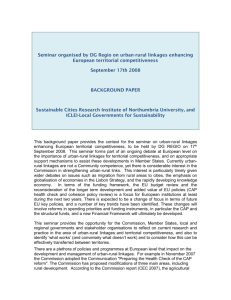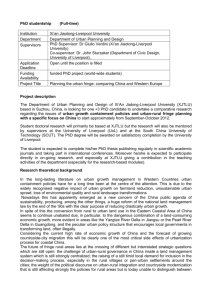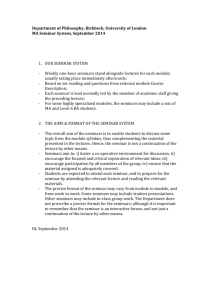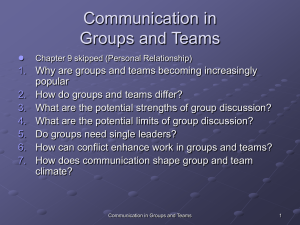DA speech at urban-rural seminar 23 January 2009
advertisement
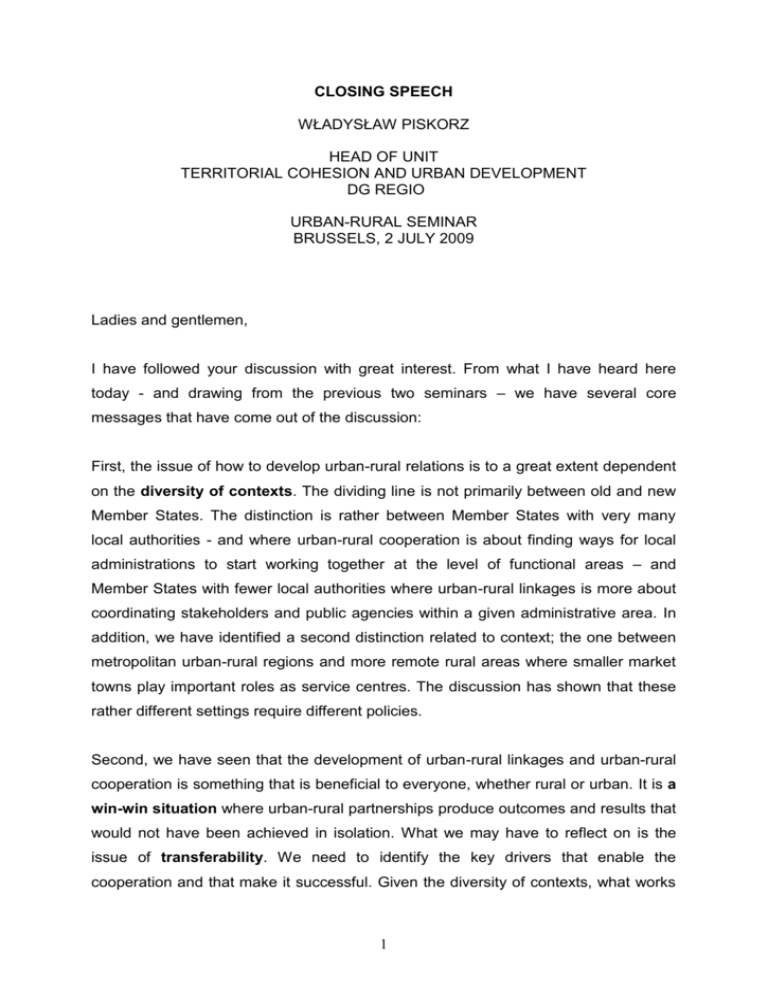
CLOSING SPEECH WŁADYSŁAW PISKORZ HEAD OF UNIT TERRITORIAL COHESION AND URBAN DEVELOPMENT DG REGIO URBAN-RURAL SEMINAR BRUSSELS, 2 JULY 2009 Ladies and gentlemen, I have followed your discussion with great interest. From what I have heard here today - and drawing from the previous two seminars – we have several core messages that have come out of the discussion: First, the issue of how to develop urban-rural relations is to a great extent dependent on the diversity of contexts. The dividing line is not primarily between old and new Member States. The distinction is rather between Member States with very many local authorities - and where urban-rural cooperation is about finding ways for local administrations to start working together at the level of functional areas – and Member States with fewer local authorities where urban-rural linkages is more about coordinating stakeholders and public agencies within a given administrative area. In addition, we have identified a second distinction related to context; the one between metropolitan urban-rural regions and more remote rural areas where smaller market towns play important roles as service centres. The discussion has shown that these rather different settings require different policies. Second, we have seen that the development of urban-rural linkages and urban-rural cooperation is something that is beneficial to everyone, whether rural or urban. It is a win-win situation where urban-rural partnerships produce outcomes and results that would not have been achieved in isolation. What we may have to reflect on is the issue of transferability. We need to identify the key drivers that enable the cooperation and that make it successful. Given the diversity of contexts, what works 1 in one region may not work in another. It seems we need to look closer the conditions for success and whether they are transferable in a broader context. Third, our seminars have shown a clear interest among stakeholders to develop urban-rural cooperation. We now have to reflect on how to take this interest further: Looking at cohesion policy and more specifically the future of it, how to develop specific delivery mechanisms in order to better respond to the challenges faced in the urban-rural context? One possibility is to define a specific budget and to delegate the implementation and administration to the level of the individual functional area. But as you all know, cohesion policy is a shared competence between Member States and the Commission where also regions have a crucial role to play. All these levels are important and we need to strike a balance between all interests involved. As regards the content, the actual themes of cooperation; is it a model that is 100% bottom-up-based and where rural-urban partnerships themselves decide on which areas to cooperate that we wish to see? Or do we prefer a model following what is currently used for LEADER and where we work with a set menu within the legal framework from which partnerships pick the themes mostly relevant to the needs of their areas? Where is the European added value in all this? Why should the European Union and its cohesion policy support these kinds of initiatives? Is this not an issue that falls within the competence of individual Member States? For me, the role of the European Union is clear. European support for urban-rural partnerships signals that the Commission has an interest in the development and work of such partnerships. In addition, the European engagement provides for the exchange of experience and the transfer of best (and not so good) practice across Europe. One practical way to take this forward is to establish an information bank at European level with easy access for all who are interested. 2 Ladies and gentlemen, We have almost come to the end of today's exercise which also marks the end of this series of seminars. But it does not all end here, in fact we are just in the beginning: Today's seminar has given food for thought which we will bring with us in the discussions on the future of the Cohesion policy. We need to thoroughly prepare this. Ideally, we do this together and I encourage you to actively participate in the debate on the post-2013 period. That is why I invite you to come to our conferences and participate in any future public consultations. The issue of urban-rural linkages and urban-rural partnerships is closely related to the development of integrated local development initiatives. As a follow-up to this series of seminars, we will be organizing two seminars on local development. The aim is to look at past and present experience of integrated and participative local development in Europe with a view to assess if and how this could be taken forward into the new cohesion policy programming period. The exact format as well as timing still needs to be set but the idea is to arrange a first seminar by the end of this year and another during the first half of 2010. We will keep you informed about this initiative and let you know once the dates are decided. Finally, I would like to thank: Colleagues at Cities Research Centre at the University of the West of England and the Countryside and Community Research Institute for the preparatory work and presentations made. Representatives of the case studies who have shared with us their practical experience of urban-rural cooperation Our keynote speaker, Mrs Seija Virkkala from University of Vaasa 3 Our key note listeners Elena Saraceno, Mark Shucksmith and Michael Dover Mrs Antonia Carparelli from DG EMPL Special thanks go to Michael Dover and Nigel Curry who have moderated the seminar and to the interpreters for their work and without whom this seminar would not have been possible to arrange. Lastly, I would like to thank all of you for your contributions and hope to see many of you at the future events we are going to organize. Thanks for your attention! 4
